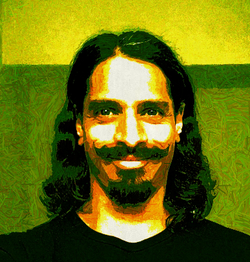― Paulo Coelho
Sometimes when I'm grounded in traffic on Guadalupe St. headed towards downtown, my mind wanders as I stare off into the windows of the buildings around me. I see myself looking back at me through the mirrored reflection and I think of what it must be like to be able to see beyond the physical limitations of human sight. Within the mirrored hallway of buildings on either side of the street, I can perceive the flow of traffic much farther ahead. I can see the sun light reflected back onto a walkway that has already seen the rise and fall of the sun earlier in the day. With the catalogue of fantasy books and films made on extraordinary superpowers, I too wonder what it must be like to be capable of accurately seeing the information contained within the reflected light. Everything is contained within the reflection of a reflection! It's like peering into an abyss....
On a Sunday afternoon, I found myself reading in a coffee shop about the Buddha. Buddhism began nearly 2500 years ago in Asia near India, Nepal, and China. The man who would become the Buddha or "enlightened one", was born a prince who was prophesied to become either a great king or a holy person. His path was unclear, but his father had hoped for him to ascend to the throne. The prince grew up with all the advantages of privilege, pleasure, and education; however, he felt an unquenchable calling in his soul to seek enlightenment. His desire to understand had led him to discover the nature of the world. He saw that most do not live within the confines of wealth and abundance. He vowed to conquer suffering and death as well as share this information with his fellow man. He left his life of family and attachments to seek enlightenment. He studied under various spiritual gurus until he mastered their abilities to temporarily tune out the distractions of the world, yet he was still unsatisfied with this stop-gap measure. He reasoned that despite reaching the highest levels of meditation and self discipline, one could not quiet the stirring pangs of desire in their mind. In his years of travel and contemplation, he discovered enlightenment while resting under the Bodhi tree. He concluded that life itself was a state of suffering, and that this suffering was the result of desire. The Buddha was a compassionate man and could feel the energy and thoughts of others. He could peer into their souls and see the root of their suffering and offer solutions to help them become free. He discovered that he was the incarnate of the many Buddhas (enlightened ones) before him and of those to come (like the laughing Buddha).
He reasoned that each person was attached to the illusion that their life and their perception of the world was as it truly is, when in fact reality is closer to the intersection of perception from every life. In other words, when two people argue their version of the truth, each believes themselves to be right when the truth is most likely closer to the overlap of both people's perceptions. The Buddha further reasoned that all things are temporal and connected to this illusion. He reasoned that life is more than simply you and me, the past or future; He believed we are connected empathically to all things in the here and now present. "There is no inhale, no exhale, just breath."
After reading about the Buddha, I decided to walk to church. I ran into homeless people begging for money. I acknowledged and prayed with them as I made my way to the cathedral. In the gospel, John the baptist spoke of how he had seen Jesus coming to be baptized and yet he "did not know him". Only through fulfilling his life's mission was John able to finally see Christ for who he truly was. The priest giving the homily commented that even at times some of the Apostles could not tell Christ by his physical form, indicating that His Spirit was the only way to truly know Him. They would question and Christ would answer, "I have been with you all and yet you do not know me?" He continued to address Phillip, "Believe me when I say that I am in the Father and the Father is in me." Christ told his disciples that he would be going away for a while, but that God would send a Helper, who will stay with them forever.
"He is the Spirit, who reveals the truth about God. The world cannot receive him, because it cannot see him or know him. But you know him, because he remains with you and is in you."
John 14:17
The priest talked of the Spirit of Christ capable of existing within everyone and how Christ comes to us sometimes in forms that we do not recognize. He cited the mysterious case of St Martin of Tours, who was approached by a beggar and used his sword to shear half of his cloak to clothe the naked man. Later in a dream he witnessed Christ telling his angels that Martin had clothed him. Dreams are difficult to interpret and psychologists have their theories, but it was enough to convince Martin to change from being a soldier into a man of God.
It's almost typical of God to work this way. One encounter changes everything. We come across dozens of people everyday. Each person capable of carrying the light of truth within them. Each person capable of reflecting that light onto others and they onto those of whom they will meet. It's a veritable hall of mirrors but instead of illusion, the light being reflected carries the Truth.
"And we, with our unveiled faces reflecting like mirrors the brightness of the Lord, all grow brighter and brighter as we are turned into the Image that we reflect." (2 Cor. 3:18)



 RSS Feed
RSS Feed
